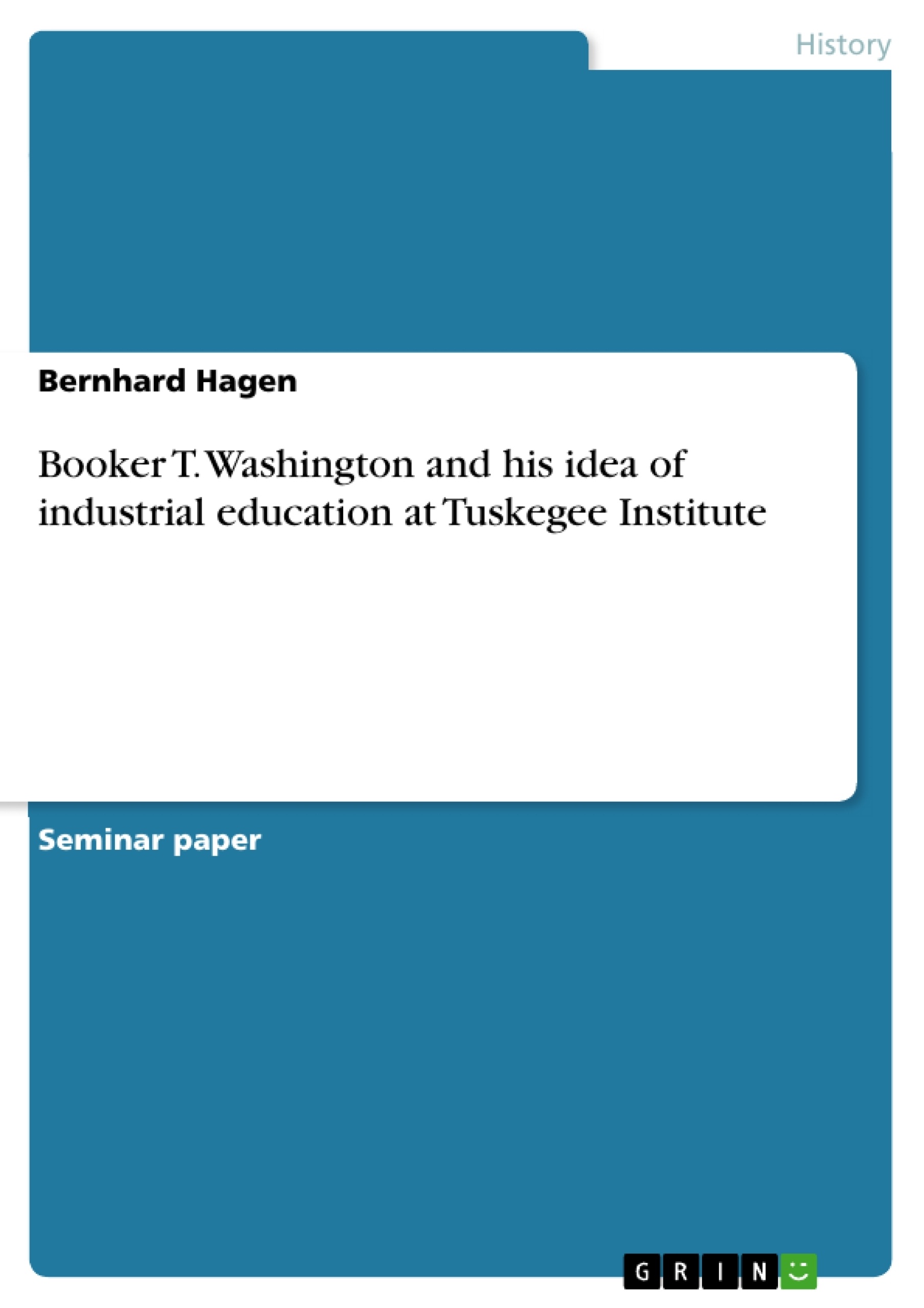In this paper, I want to discuss the life, the ideas and the influence of Booker Taliaferro Washington. Born as a slave, Booker T. Washington rose to become a well known leader of colored people in the United States. Although he always tried to show other black men and women how to improve their lives, his leadership became controversial. Ironically, his critics argued he would keep the colored people down and he would slow down improvements. Washington’s most important idea was the “self-education” and “self-help”, and from the founding of Tuskegee Institute in 1881 to his death in 1915 Booker T. Washington tried to realize this idea and was very influential in doing this. The second very influential black leader of that time was William E. B. Du Bois. His concept of the “talented-tenth” represented those who thought that Washington placed too much importance on industrial education. To understand Booker T. Washington’s ideas and concepts, it is necessary to take a look at his life. Therefore, I want to show the story of Booker T. Washington, his childhood and his raise to a leader of the colored people in the beginning of this paper. Then I want to discuss the Tuskegee institute and Washington’s approach to the problems of the African-American population.
Table of Contents
- I. Introduction
- II. The life of Booker T. Washington
- II.1. Childhood
- II.2. Hampton Institute
- II.3. The early years at Tuskegee Institute
- II.4. Booker T. Washington's raise to popularity
- III. The ideas of Booker T. Washington
- III.1. The importance of work - Industrial Education
- III.2. The Success story of Tuskegee
- III.3. Religious and Spiritual Goals
- IV. Conclusion
Objectives and Key Themes
This term paper aims to explore the life, ideas, and influence of Booker Taliaferro Washington, a prominent African-American leader who rose from slavery to become a prominent figure in the United States. The paper will examine Washington's childhood, his rise to prominence, and the development and impact of Tuskegee Institute, a prominent institution of industrial education founded by Washington. The paper will also analyze Washington's controversial leadership style, which emphasized industrial education and self-reliance for African-Americans.
- The life and impact of Booker T. Washington
- The role and significance of industrial education
- The rise and influence of Tuskegee Institute
- The challenges faced by African-Americans in the late 19th and early 20th centuries
- The debate surrounding Washington's approach to racial advancement
Chapter Summaries
The first chapter introduces Booker T. Washington, emphasizing his rise from slavery to a prominent leader in the fight for racial equality. This chapter also highlights the significance of Washington's commitment to industrial education and his influence on African-American communities.
Chapter two provides a detailed account of Washington's childhood, emphasizing the hardship and challenges he faced during his early years. This chapter explores the impact of slavery on Washington's life and the critical role it played in shaping his later beliefs and approaches.
Chapter three examines Washington's life and experiences at Hampton Institute, a prominent institution of higher education that provided a foundation for his later work at Tuskegee Institute.
Chapter four focuses on the early years of Tuskegee Institute, highlighting its role in providing industrial education and fostering economic and social advancement for African-Americans.
Chapter five examines Washington's rise to popularity and his influence on the national stage, exploring his impact on the debate surrounding racial equality and his significant contributions to the development of African-American communities.
Chapter six explores the importance of work and industrial education in the philosophy of Booker T. Washington, highlighting the value of practical skills and self-reliance in achieving racial uplift.
Chapter seven discusses the success of Tuskegee Institute, highlighting its achievements in providing education and training for African-Americans, and its role in promoting economic opportunities.
Chapter eight explores the religious and spiritual goals of Booker T. Washington, examining the influence of his faith and his commitment to spiritual growth as a means of achieving racial advancement.
Keywords
Booker T. Washington, Tuskegee Institute, industrial education, self-reliance, racial equality, African-American history, slavery, emancipation, civil rights, education reform, economic empowerment, Atlanta Exposition Address, the "Talented Tenth," William E. B. Du Bois.
Frequently Asked Questions
Who was Booker T. Washington?
Born a slave, he became a prominent African-American leader, educator, and the founder of the Tuskegee Institute.
What was Washington's idea of "industrial education"?
He emphasized practical skills and work as a means for African-Americans to improve their lives and achieve economic self-reliance.
Why was Washington's leadership controversial?
Critics like W.E.B. Du Bois argued that his focus on industrial education and accommodation to segregation slowed down the fight for full civil rights.
What is the significance of the Tuskegee Institute?
Founded in 1881, it became a model for vocational training and fostered economic advancement for the African-American population.
What was the "Talented Tenth" concept?
It was a concept by Du Bois representing the idea that an elite group of educated black leaders should lead the race toward social equality, contrasting Washington's vocational focus.
- Quote paper
- Bernhard Hagen (Author), 2002, Booker T. Washington and his idea of industrial education at Tuskegee Institute, Munich, GRIN Verlag, https://www.grin.com/document/29254



